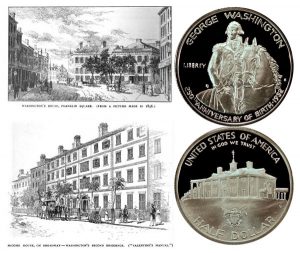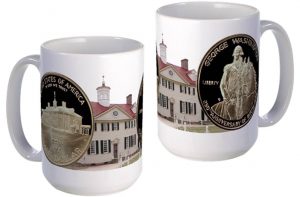Today, the George Washington Commemorative Silver Half Dollar Coin remembers when the president-elect arrived in Elizabethtown and traveled across the water to New York on April 23, 1789.
Over several days in April 1789, George Washington traveled from Mount Vernon to New York for his inauguration.
An excerpt from an article titled The Inauguration of Washington from The Century Illustrated Monthly Magazine, for April 1889 described one of those days:
=====
Thursday, April 23, was an eventful day to Washington.
At Bridgeton his military escort was augmented, and as he approached Elizabethtown, between 8 and 9 o’clock in the morning, he received “a Federal salute from the cannon” and stopped at the public-house of Samuel Smith, where he received the congratulations of the town and the committee of Congress.
Here he breakfasted, and then waited upon the congressional committee at the residence of Elias Boudinot, chairman of the committee. From Dr. Boudinot’s house he proceeded to Elizabethtown Point under a large civic and military escort, which included companies from Newark and vicinity.
At Elizabethtown Point Washington stepped aboard a magnificent barge which had been made to convey him up the bay to New York. The boat cost between two hundred and three hundred pounds and was rowed by thirteen masters of vessels dressed in white uniforms and black caps ornamented with fringes.
Commodore James Nicholson was commander and Thomas Randall acted as cockswain.
In the President’s barge and the six others accompanying were the congressional committee, John Langdon, Charles Carroll, and William Samuel Johnson of the Senate, Elias Boudinot, Theodoric Bland, Thomas Tudor Tucker, Egbert Benson, and John Lawrence of the House; Chancellor Livingston; John Jay, Secretary for Foreign Affairs; Samuel Osgood, Arthur Lee, and Walter Livingston, Commissioners of the Treasury; General Henry Knox, Secretary of War; Ebenezer Hazard, Postmaster-General; Colonel Nicholas Fish, Adjutant-General of the forces of New York State; Richard Varick, Recorder of the city; and other dignitaries.
A discharge of artillery was given on the embarkation of the President at 12 o’clock. But better than the accounts given in the newspapers is the letter descriptive of the sail up New York harbor to the foot of Wall street, written the next day by Elias Boudinot to his wife:
—–
You must have observed with what a propitious gale we left the shore and glided with steady motion across the Newark Bay, the very water seeming to rejoice in bearing the precious burden over its placid bosom.
The appearance of the troops we had left behind and their regular firings added much to our pleasure.
When we drew near to the mouth of the Kills a number of boats with various flags came up with us and dropped in our wake. Soon after we entered the bay General Knox and several other officers in a large barge presented themselves with their splendid colors.
Boat after boat, sloop after sloop, gaily dressed in all their naval ornaments, added to our train and made a most splendid appearance.
Before we got to Bedloe’s Island a large sloop came with full sail on our starboard bow, when there stood up about twenty gentlemen and ladies, who with most excellent voices sung an elegant ode, prepared for the purpose, to the tune of “God Save the King,” welcoming their great chief to the seat of government.
On its conclusion we saluted them with our hats, and then they with the surrounding boats gave us three cheers.
Soon after, another boat came under our stern and presented us with a number of copies of a second ode, and immediately about a dozen gentlemen began to sing it, in parts, as we passed along.
Our worthy President was greatly affected with these tokens of profound respect.
As we approached the harbor, our train increased, and the huzzaing and shouts of joy seemed to add life to this brilliant scene.
At this moment a number of porpoises came playing amongst us as if they had risen up to know what was the cause of all this happiness.
We now discovered the shores to be crowded with thousands of people — men, women, and children; nay, I may venture to say tens of thousands, from the fort to the place of landing, although near half a mile, you could see little else along the shore, in the streets, and on board every vessel but heads standing as thick as ears of corn before the harvest.
The vessels in the harbor made a most superb appearance indeed, dressed in all their pomp of attire.
The Spanish ship-of-war the Galveston in a moment, on a signal given, discovered twenty-seven or twenty-eight different colors, of all nations, on every part of the rigging, and paid us the compliment of thirteen guns, with her yards all manned, as did also another vessel in the harbor, the North Carolina, displaying colors in the same manner.
We soon arrived at the ferry stairs, where there were many thousands of the citizens waiting with all the eagerness of expectation to welcome our excellent patriot to that shore which he regained from a powerful enemy by his valor and good conduct.
We found the stairs covered with carpeting and the rails hung with crimson.
The President, being preceded by the committee, was received by the governor and the citizens in the most brilliant manner. He was met on the wharf by many of his old and faithful officers and fellow-patriots, who had borne the heat and burthen of the day with him, who like him had experienced every reverse of fortune with fortitude and patience, and who now joined the universal chorus of welcoming their great deliverer (under Providence) from all their fears.
It was with difficulty a passage could be made by the troops through the pressing crowds, who seemed incapable of being satisfied with gazing at this man of the people.
You will see the particulars of the procession from the wharf to the house appointed for his residence in the newspapers.
The streets were lined with the inhabitants, as thick as they could stand, and it required all the exertions of a numerous train of city officers, with their staves, to make a passage for the company.
The houses were filled with gentlemen and ladies, the whole distance being about half a mile, and the windows to the highest stories were illuminated by the sparkling eyes of innumerable companies of ladies, who seemed to vie with each other in showing their joy on this great occasion.
It was half an hour before we could finish our commission and convey the President to the house prepared for his residence.
As soon as this was done, notwithstanding his great fatigue of both body and mind, he had to receive the gentlemen and officers to a very large number, who wished to show their respect in the most affectionate manner.
When this was finished and the people dispersed, we went (undressed) and dined with his Excellency Governor Clinton, who had provided an elegant dinner for us.
Thus ended our commission.
The evening, though very wet, was spent by all ranks in visiting the city, street after street being illuminated in a superb manner.
I cannot help stating now how highly we were favored in the weather.
The whole procession had been completely finished and we had repaired to the governor’s before it began to rain.
When the President was on the wharf an officer came up, and addressing him said he had the honor to command his guard, and that it was ready to obey, his orders.
The President answered that, as to the present arrangement, he should proceed as was directed, but that after that was over he hoped he would give himself no farther trouble, as the affection of his fellow-citizens (turning to the crowd) was all the guard he wanted.
—–
As the barge drew up to Murray Wharf, near the Coffee House, about 3 o’clock Thursday afternoon, cannons were again fired, the bells of the city began to ring and continued for half an hour.
Washington was dressed in a plain suit, consisting of blue coat and buff waistcoat and breeches.
Miss Quincy, looking out of a window in a store on the wharf, wrote:
—–
Carpets were spread to the carriage prepared for him, but he preferred walking through the crowded streets and was attended by Governor Clinton and many officers and gentlemen.
He frequently bowed to the multitude and took off his hat to the ladies at the windows, who waved their handkerchiefs, threw flowers before him, and shed tears of joy and congratulations.
The whole city was one scene of triumphal rejoicing.
His name in every form of decoration appeared on the fronts of the houses, and the streets through which he passed to the governor’s mansion were ornamented with flags, silk banners of various colors, wreaths of flowers, and branches of evergreens.
Never did any one enjoy such a triumph as Washington, who indeed “read his history in a nation’s eyes.”
—–
The procession, headed by Colonel Morgan Lewis, consisted of music, a troop of horse, artillery officers off duty, the grenadiers that served as a guard of honor to the President, the governor and officers of the State, the congressional committee, the Mayor and Corporation, the clergy, the French and Spanish ambassadors, and citizens.
The whole passed through Queen street, by Governor Clinton’s house at the foot of Cedar street, and stopped at the Franklin House, which had been fitted up as a residence for Washington.
From 7 till 9 o’clock in the evening, while Washington was dining with a distinguished company at Governor Clinton’s house, the city was brilliantly illuminated.
The day had indeed been a glorious one.
On all sides was heard the expression, “Well, he deserves it all!” and many who were in the crowd said that “they should now die contented, nothing being wanted to complete their happiness, previous to this auspicious period, but the sight of the Savior of his Country.”
It had been “a day of extravagant joy.”
Of the 23d of April Washington wrote in his diary:
The display of boats which attended and joined us on this occasion, some with vocal and some with instrumental music on board, the decorations of the ships, the roar of cannon, and the loud acclamations of the people which rent the skies as I walked along the streets, filled my mind with sensations as painful (considering the reverse of this scene, which may be the case after all my labors to do good) as they are pleasing.
=====
The George Washington Commemorative Silver Half Dollar Coin shows with artists’ images of two homes he used in New York while president.

